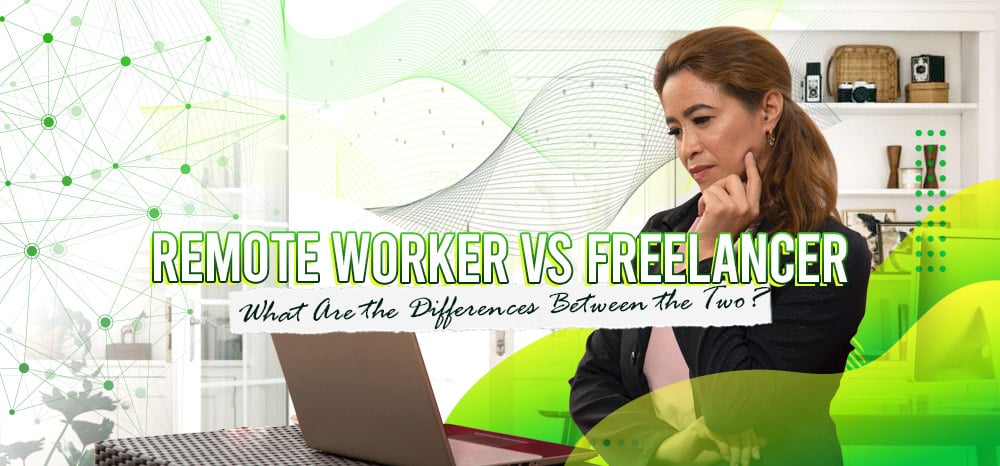Who is a remote worker, and who is a freelancer?
Much of the corporate world changed after the pandemic. Many companies have started offering flexible work arrangements and they’re here to stay. Altogether, the definitions of both roles have blurred.
So, let’s discuss the difference between remote workers and freelancers.
Remote Worker Vs Freelancer

In brief, a remote worker is a full-time employee who works outside the company premises. The term also usually means they work from home.
Still, being a remote worker sometimes carries a different meaning. It can also pertain to remote staffing, where companies hire workers with specific skills. Usually, firms partner with staffing agencies to access qualified candidates.
In comparison, a freelancer works independently. It is also no secret that many freelancers are working with multiple clients. They also have different pricing models (similar to many virtual assistants), so it’s best to know which works for your business needs.
So, how do you choose between the two? Consider the following points.
Talent Accessibility Vs Time Flexibility

With a remote worker under a staffing company, you gain access to a database of highly talented professionals. You no longer have to worry about the tedious recruitment process either.
As a client, interviews are one way to check your compatibility with a remote worker -otherwise, the agency can suggest a different candidate.
However, freelancers offer more flexibility in terms of their contracts.
Thus, they are better suited for temporarily filling in the gaps in your organization and may not be required to work for a fixed number of hours per week.
Again, it depends on what your company requires.
Cost-Effectiveness Vs Cost-Efficiency

Hiring remote workers may be the more economical option. You get the most out of your investment because they are contractually bound to your company for a longer period of time. This means a lower possibility of turnover, which saves you from having to hire and retrain more workers over time.
However, remote workers must be integrated into your existing workforce even though they work in various locations (sometimes in a different country or continent). Doing so ensures smooth cooperation and teamwork within your organization.
In the case of freelancers, they can lower your operating costs from the very beginning. However, there is a degree of risk involved. Both freelancers and clients can terminate their contracts at any time.
This can be costly on your end because you will have to start the hiring process all over again.
Supervising Remote Workers Vs Relying on Freelancers

With both remote workers and freelancers, constant communication is the key. After all, you’re dealing with a distributed team in both instances.
Furthermore, employing an agency eases your administrative workload when hiring remote workers. The staffing company will also be responsible for following up on the virtual employees should they fail to show up for work.
All this adds a layer of accountability for your peace of mind.
As previously mentioned, if you hire freelancers through online platforms like Upwork, you have to be prepared for the possibility of contract termination at any given time.
Overall, recruiting remote workers may be financially less risky than freelancing.
Still, it’s best to evaluate what your company actually needs.
If you are working on a short-term project, then freelancers may be your best bet. However, if you are thinking of adapting to an increasingly digitized world, then it’s probably best to hire remote workers.
Remote Staff has accumulated a robust pool of highly skilled Filipino remote workers. With over 15 years of experience, Remote Staff has developed a tried and tested strategy for sourcing the best remote talents from all over the Philippines.
While the company initially catered to Australian clients, Remote Staff is bringing its brand to the United Kingdom. If you are an SME owner looking for talented Filipino remote workers with which to grow your company, call or schedule a callback today.

